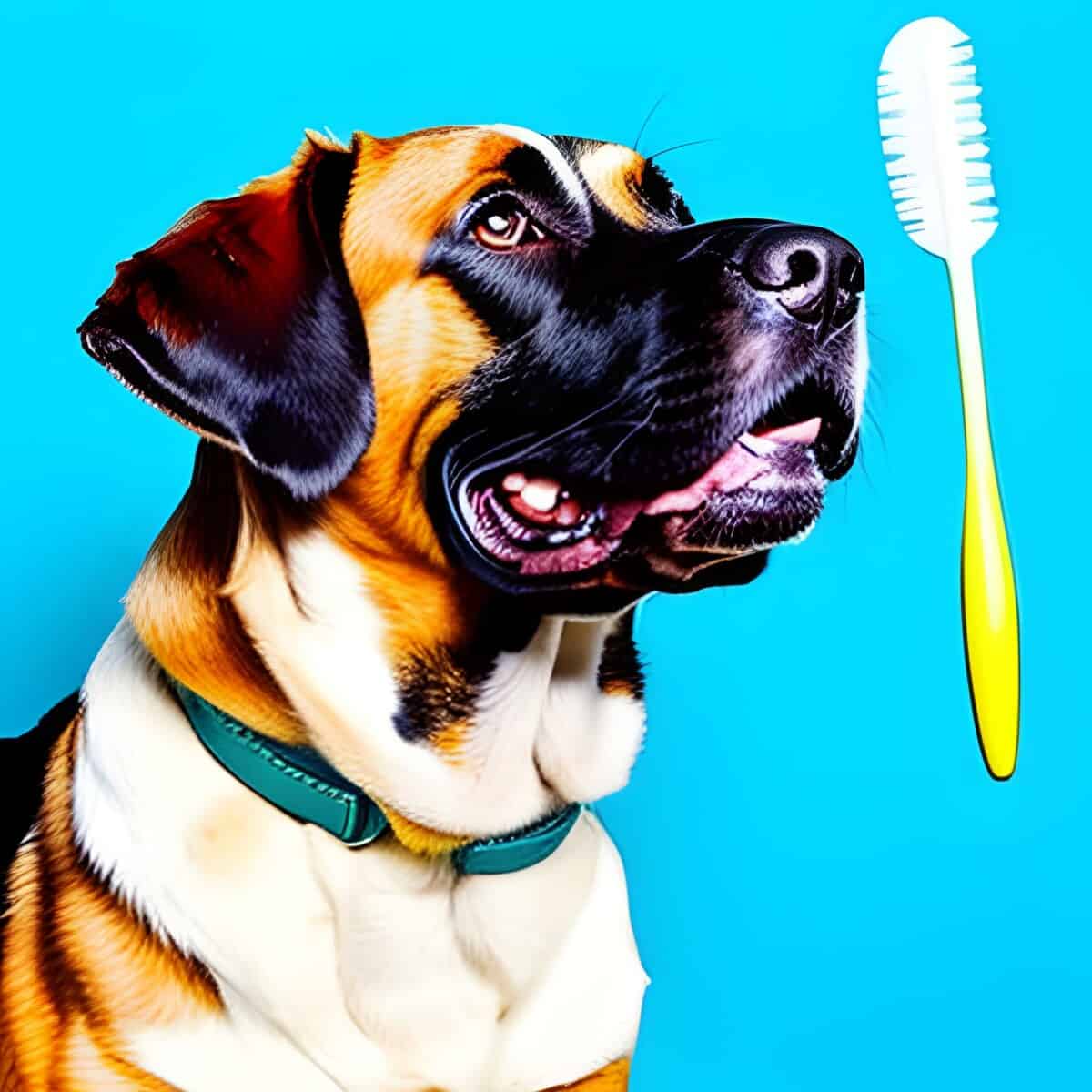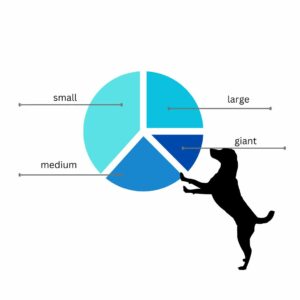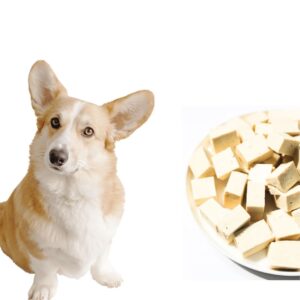“ Is my dog too old for teeth cleaning” is a common question senior dog owners ask vets.
So we did the same, we asked 20 different peer vets if anesthesia is dangerous for senior dogs, and while there are some risks, all of them believe that there is more danger in not taking action.
According to a study by Banfield Pet Hospital, dental cleanings were performed on 13% of dogs aged 9 to 12 years old, and on 24% of dogs over 13 years old.
Teeth cleaning is not an aesthetic procedure, but a vital part of senior dog healthcare.
Good dental health is crucial for dogs of all ages, but around 80% of dogs over three suffer from tooth and gum disease.
While some owners worry about anesthesia during teeth cleaning, age itself isn’t a barrier. What matters is your dog’s health and avoiding serious health issues.
In this guide, we will talk about the pros and cons, types of dental cleaning, risks, and pricing so you can bring informed decisions together with your vet.
Is my dog too old for teeth cleaning: table of contents
Signs That Your Dog Needs Teeth Cleaning
Signs that your dog needs teeth cleaning include:
- bad breath,
- visible plaque buildup,
- bleeding gums,
- loose teeth,
- difficulty chewing.
Of all the signs that indicate your dog needs teeth cleaning, bad breath is the most common.
Studies have shown that more than 80% of dogs over the age of three have some degree of dental disease, with bad breath being one of the earliest signs.
This is due to bacteria that produce sulfur compounds that result in a foul odor.
Visible plaque buildup is another clear indication that your dog needs teeth cleaning. Plaque is a sticky film of bacteria and food particles that accumulates on the teeth, and if left untreated, can harden into tartar.
Tartar buildup not only looks unsightly, but it can also cause gum disease, which can lead to tooth loss.
Bleeding gums appear red, swollen and bleed easily. These symptoms are also indications of gingivitis, which is the early stage of gum disease.
If left untreated, gingivitis can progress to periodontitis, which is a more advanced form of gum disease that can result in tooth loss.
If you notice any loose teeth in your dog’s mouth, it’s definitely time for a dental checkup. Loose teeth can be a sign of advanced gum disease or other dental problems, and they can cause your dog significant discomfort when eating or playing.
If your dog seems to be having difficulty chewing or refuses to eat hard food, it may be an indication of dental pain or discomfort.
This can be caused by tooth decay, infection, or gum disease. A dental exam can help identify the underlying cause of the problem and ensure that your dog gets the necessary treatment.
Recognizing the signs that your dog needs teeth cleaning is crucial for maintaining their overall health and well-being. Regular dental checkups can help prevent dental disease and ensure that your dog’s teeth and gums remain healthy throughout their life.
Age and Teeth Cleaning
Senior dogs are more susceptible to dental problems such as periodontal disease, oral tumors, broken teeth, and worn teeth.
Older dogs are more likely to develop oral tumors, which can be difficult to detect without an anesthetized oral examination.
Common malignant oral tumors in dogs include:
- melanomas,
- fibrosarcomas,
- squamous cell carcinomas.
Comprehensive dentistry, including an anesthetized oral exam, can help detect these tumors early on and allow for biopsies to be performed during the same procedure.
Regular teeth cleaning can help prevent and address these issues, which can ultimately lead to a longer and healthier life for your senior dog.
Professional dental cleaning involves removing plaque and tartar buildup, addressing any underlying dental issues, and polishing the teeth to prevent future buildup.
Neglecting dental care in older dogs can lead to serious health risks.
Bacteria from dental disease can spread to other organs, causing infections that can be life-threatening. In fact, studies have shown that dogs with severe periodontal disease have a higher risk of developing heart disease and other systemic diseases as well other health issues.
Types of Teeth Cleaning for Senior Dogs
There are two main types of teeth cleaning for senior dogs:
- professional teeth cleaning
- at-home teeth cleaning
Professional teeth cleaning in senior dogs
Professional teeth cleaning involves scaling and polishing, which removes tartar and plaque buildup.
However, there are two types of professional teeth cleaning:
- anesthesia
- non-anesthesia.
Anesthesia teeth cleaning is the most thorough method, as it allows the vet to perform a comprehensive oral exam, X-rays, and clean below the gum line where periodontal disease can begin.
It is also less stressful for the dog, as they are unconscious during the procedure.
According to a study by the American Veterinary Dental Society, anesthesia teeth cleaning is the safest and most effective method of dental cleaning for dogs.
Non-anesthesia teeth cleaning is less invasive and does not require sedation. However, it is not as thorough, and the vet may not be able to clean below the gum line, where bacteria can hide and cause dental disease.
At-home teeth cleaning in senior dogs
Brushing your dog’s teeth and use of dog toothpaste is the most effective method of at-home dental care, as it removes plaque, prevents tartar buildup, and maintains oral health.
A study published in the Journal of Veterinary Dentistry found that daily brushing can reduce the prevalence of periodontal disease by up to 70%.
Dental treats and chews, such as rawhide or dental sticks, can also help remove plaque and freshen breath.
Water additives, which are added to your dog’s drinking water, can help reduce plaque and tartar buildup. These additives usually contain enzymes that break down plaque and bacteria in your dog’s mouth.
Preparing Your Senior Dog for Teeth Cleaning
Preparing your senior dog for teeth cleaning is an important part of the process to ensure a successful outcome.
Here are some details and statistics on how to prepare your senior dog for teeth cleaning:
Consulting with Your Vet
It’s crucial to consult with your vet before scheduling a teeth cleaning appointment for your senior dog.
This consultation will help determine if your dog is a good candidate for teeth cleaning and identify any potential risks or complications. Your vet can also recommend the best type of teeth cleaning procedure for your dog’s specific needs.
Pre-Procedure Checkup
A pre-procedure checkup is necessary to evaluate your senior dog’s overall health and detect any underlying health conditions that may complicate the teeth cleaning procedure.
Your vet may perform blood tests, X-rays, or other diagnostic tests to evaluate your dog’s health before the teeth cleaning.
Fasting Before Teeth Cleaning
Your senior dog may need to fast for a certain amount of time before the teeth cleaning procedure.
This is usually to prevent vomiting or other complications during anesthesia. Your vet will provide specific instructions on when to stop feeding your dog and how long the fasting period should last.
Pre-Procedure Home Care
To ensure a successful teeth cleaning procedure, you can provide pre-procedure home care for your senior dog. This can include brushing their teeth regularly with dog-specific toothpaste, providing dental treats and dental chews to help reduce plaque and tartar buildup, and using water additives to promote oral hygiene.
Aftercare for Senior Dogs After Teeth Cleaning
After teeth cleaning, your senior dog will need post-procedure checkups, pain management, and a special diet for a certain amount of time. At-home care such as brushing their teeth, providing soft foods, and monitoring their behavior is also important.
Post-Procedure Checkup: Your veterinarian may recommend a post-procedure checkup to ensure that your dog is healing properly. This may include a physical examination, dental evaluation, and any necessary follow-up treatment.
Pain Management: After a teeth cleaning procedure, your senior dog may experience discomfort or pain. Your veterinarian may prescribe pain medication or recommend alternative therapies, such as cold compresses or laser therapy, to help manage any pain.
Feeding and Drinking After Teeth Cleaning: Your veterinarian may recommend a special diet for your senior dog after teeth cleaning. This may include soft foods or a diet that is tailored to their specific dental needs. Your dog may also need to avoid certain types of food or treats for a certain amount of time. It is also important to ensure that your dog is drinking plenty of water to stay hydrated.
At-Home Care: Aftercare at home is also important for your senior dog’s dental health. This may include brushing their teeth regularly, providing dental treats or chews, and using water additives or other products recommended by your veterinarian. It is also important to monitor your dog’s behavior and dental health and schedule regular dental checkups to prevent future dental problems.
Tips for Maintaining Your Senior Dog’s Oral Health
Maintaining your senior dog’s oral health is crucial. This can be achieved through regular teeth cleaning, a healthy diet, chew toys and bones, and regular vet checkups.
Regular teeth cleaning is an essential part of maintaining your senior dog’s oral health. According to the American Veterinary Dental College, dogs should have their teeth professionally cleaned at least once a year. This helps remove plaque and tartar buildup, preventing the progression of dental disease. In addition to professional cleaning, regular at-home teeth cleaning, such as brushing your dog’s teeth, can also be beneficial.
A healthy diet is also important for your senior dog’s oral health. Feeding your dog high-quality, nutrient-rich food can help maintain their overall health and prevent dental problems. Avoid giving your dog sugary or sticky treats, as these can stick to their teeth and promote the growth of harmful bacteria.
Chew toys can also aid in maintaining your senior dog’s oral health. Chewing on hard toys or bones can help scrape away plaque and tartar buildup, preventing dental disease. However, it’s important to choose safe and appropriate toys for your dog to prevent any choking hazards or tooth fractures.
Regular vet checkups are crucial for maintaining your senior dog’s oral health. Your vet can perform oral exams and check for any signs of dental disease, such as plaque buildup, gingivitis, or tooth decay. They can also provide recommendations for dental care and treatment, as needed.
Complications From Dog Dental Cleaning
Older dogs may require dental cleaning, which usually requires general anesthesia.
Non-anesthesia dental cleanings only provide cosmetic benefits and fail to provide important health benefits, such as cleaning under the gums with an ultrasonic scaler and taking X-rays.
Anesthesia can sound scary, but it is necessary for a thorough dental procedure, which includes a tooth-by-tooth exam, tooth mobility tests, probing, and radiographs.
Years of tartar accumulation can cause major problems that go beyond foul breath, leading to pain and even problems with the heart, kidneys, and liver.
While older dogs can undergo anesthesia, an option may be pulse therapy antibiotics.
Common anesthesia complications in older dogs include:
- low blood pressure,
- low heart rate,
- low blood oxygen,
- low body temperature,
- prolonged recovery.
Senior Dog dental cleaning Vet Q+A
How many dogs die from teeth cleaning?
The incidence of death associated with teeth cleaning in dogs is considered rare, but it can still occur. According to a study published in the Journal of the American Animal Hospital Association, the risk of death associated with anesthesia for dental procedures in dogs was 0.17%.
This means that out of 1000 dogs undergoing teeth cleaning under anesthesia, 1.7 dogs may experience a fatal outcome.
However, it’s important to note that many factors can influence the risk of anesthesia-related deaths, including the dog’s age, health status, and the type of anesthesia used.
The risk can be significantly reduced through proper pre-procedure evaluation, monitoring during anesthesia, and post-procedure care. It’s important to discuss any concerns about the risks associated with teeth cleaning with your veterinarian.
What are the complications of dog dental cleaning?
Complications from dog dental cleaning can include anesthesia-related risks, such as breathing difficulties or cardiac arrest, as well as bleeding, infection, and damage to teeth or gums.
While complications are rare, they can occur, especially in senior dogs with pre-existing health conditions. It’s important to have a pre-procedure checkup and discuss any potential risks with your vet before scheduling teeth cleaning for your senior dog.
With proper preparation and monitoring, the risks of complications can be minimized.
What happens if you don’t get your dog’s teeth cleaned?
If you don’t get your dog’s teeth cleaned, your dog can develop dental disease, which can lead to a host of health problems.
The buildup of plaque and tartar on teeth can lead to harmful bacteria, which can cause systemic infection if left untreated. These bacteria can spread to vital organs like the heart, kidneys, and liver.
Dental disease is also painful, and inflammation and infection associated with periodontal disease can cause discomfort, especially if there is bone involvement. In severe cases, tooth loss and jaw fractures can occur.
Bad breath and difficulty eating can also be signs of dental disease. It’s important to take your dog for regular vet checkups and to maintain their oral health through regular teeth cleaning and at-home care to prevent these issues from arising.
How much does dog teeth cleaning cost?
The cost of dog teeth cleaning can vary depending on various factors, such as the location, the veterinarian, the type of cleaning needed, and the age of the dog.
On average, professional dog teeth cleaning can cost anywhere from $300 to $700 and may cost more if extractions or other dental procedures are needed.
Anesthesia-free dental cleanings may be less expensive, but they may not be as effective as a professional cleaning done under anesthesia.
It’s important to talk to your veterinarian about the specific needs of your dog and the associated costs for their dental care.
My Senior Paws is a participant in the Amazon Services LLC Associates Program, an affiliate advertising program designed to provide a means for sites to earn advertising fees by advertising and linking to Amazon.com. We also participate in other affiliate programs which compensate us for referring traffic.




